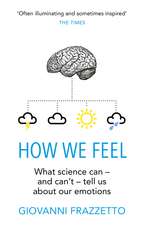PTSD: Brain Mechanisms and Clinical Implications
Editat de N. Kato, M. Kawata, R.K. Pitmanen Limba Engleză Hardback – 31 ian 2006
| Toate formatele și edițiile | Preț | Express |
|---|---|---|
| Paperback (1) | 945.62 lei 6-8 săpt. | |
| Springer – 22 oct 2016 | 945.62 lei 6-8 săpt. | |
| Hardback (1) | 951.77 lei 6-8 săpt. | |
| Springer – 31 ian 2006 | 951.77 lei 6-8 săpt. |
Preț: 951.77 lei
Preț vechi: 1160.70 lei
-18% Nou
Puncte Express: 1428
Preț estimativ în valută:
182.13€ • 194.75$ • 151.85£
182.13€ • 194.75$ • 151.85£
Carte tipărită la comandă
Livrare economică 17 aprilie-01 mai
Preluare comenzi: 021 569.72.76
Specificații
ISBN-13: 9784431295662
ISBN-10: 4431295666
Pagini: 304
Ilustrații: XI, 304 p. 2 illus. in color.
Dimensiuni: 155 x 235 x 19 mm
Greutate: 0.63 kg
Ediția:2006
Editura: Springer
Colecția Springer
Locul publicării:Tokyo, Japan
ISBN-10: 4431295666
Pagini: 304
Ilustrații: XI, 304 p. 2 illus. in color.
Dimensiuni: 155 x 235 x 19 mm
Greutate: 0.63 kg
Ediția:2006
Editura: Springer
Colecția Springer
Locul publicării:Tokyo, Japan
Public țintă
ResearchDescriere
Recent catastrophic events, such as the attack on the New York World Trade Center and the devastating tsunami in the Indian Ocean, have drawn increasing attention to post-traumatic stress disorder, or PTSD. Once thought of only in psychological terms, PTSD has emerged as the model mental disorder for studying the effect of the environment on human biological systems, especially the brain. This book breaks new ground by offering neuroscientific insights into PTSD and their implications for diagnosis, prevention, and treatment. The recent explosion of biological investigation into this distressing and disabling condition has been led by this volume’s authors, who range from skilled basic scientists to experienced diagnosticians and therapists. Their contributions epitomize state-of-the-art, translational research in clinical neuroscience, and will prove to be an invaluable source of reference for practitioners and researchers in this field.
Cuprins
Part I Basic Mechanism of PTSD and Stress-Related Brain Dysfunctions Neuroanatomical and Molecular Changes in Stress Responses During Early Life: Implications for Stress Disorders Toru Nishikawa, Akeo Kurumaji, Takashi Ito, Asami Umino, and Sumikazu Ishii Cortisol and PTSD: Animal Experiments and Clinical Perspectives E. Ronald de Kloet and Melly S. Oitzl Stress and Corticosteroid Receptors Mitsuhiro Kawata, Mayumi Nishi, Ken-ichi Matsuda, Hirotaka Sakamoto, Cui Honghai, and Takanori Yoshii Stress Vulnerability Induced by Neonatal Isolation and the Disturbance Between the Phosphorylation and Dephosphorylation of CREB Shigeru Morinobu, Seiichi Tsuji, Michihiro Takahashi, David S Russell, Jun Takahashi, Kazuhide Tanaka, Koichiro Fujimaki, Shigeto Yamawaki, Sachiko Endoh, and Masao Endoh Neuroscience of Emotional Memory and Posttraumatic Stress Disorder Shigenobu Kanba, Koutaro Kudo, Naoko Kaneko, Henny Wati, Hironobu Iguchi, and Keiko Takemoto Studies on Pathophysiology of PTSD Using the SPS Model Kazuhisa Kohda, Kunio Kato, and Nobumasa Kato Mechanisms of Lasting Change in Anxiety Induced by Severe Stress Robert Adamec, Jacqueline Blundell, K. Strasser, and Paul Burton Altered Emotional Behaviors in Mammalian Bombesin Receptor Knockout Mice: Implication for the Molecular Pathogenesis of Stress-Induced Psychiatric Disorders in Humans Keiji Wada, Kazuyuki Yamada, Yuko Santo-Yamada, Hiroshi Maeno, Etsuko Wada, and Masayuki Sekiguchi Role of Stress Hormones and the Amygdala in Creating Lasting Memories James L. McGaugh, Benno Roozendaal, and Shoki Okuda Drug Discovery for PTSD: Characterization of an Animal Model of PTSD and PET Imaging of Brain Glucocorticoid Receptor Katsuya Harada, Takahiro Matsuya, Takayuki Yamaji, Yoshihiro Murakami, Akihiko Noda, Hiroyuki Takamatsu, Kazuhiko Osoda, Nobuya Matsuoka, and Shintaro Nishimura Tissue Metabolism of Glucocorticoids: New Controls of Cognitive Function and the Stress Response Jonathan R Seckl Maternal Deprivation in Neonatal Period and Biological Rhythms Ken-ichi Honma, Ayano Yamazaki, Yoshio Ootsuki, Natsumi Noda, and Sato Honma Part II Clinical Implications for PTSD and Perspectives in Psychiatry Current Perspectives on Clinical Studies of PTSD in Japan Yoshiharu Kim Psychosocial and Genetic Susceptibility to Posttraumatic Stress Disorder Min-Soo Lee and Heon-Jeong Lee Intrusion in Women with Breast Cancer Yutaka Matsuoka, Mitsue Nagamine, and Yosuke Uchitomi Earthquake-Related PTSD: A Follow-Up Study in Prevalence, Comorbidity, Quality of Life, and Biological Correlates Tung-Ping Su, Frank Huang-Chih Chou, Wen-Chen Ou-Yang, and Pesus Chou Psychological Consequences for Students Who Survived the Ehime Maru Accident: A 26-Month Follow-Up Study Masaharu Maeda, Takayuki Maruoka, and Hisao Maeda Structural and Functional Neuroimaging in Posttraumatic Stress Disorder Kiyoto Kasai, Hidenori Yamasue, Tsuyoshi Araki, Hideshi Sakamoto, and Nobumasa Kato Functional Neuroimaging Research in Posttraumatic Stress Disorder Israel Liberzon and Brian Martis Functional Abnormality of the Prefrontal Cortex in Posttraumatic Stress Disorder: Psychophysiology and Treatment Studies Assessed by Near-Infrared Spectroscopy Toshiyuki Ohtani and Koji Matsuo Neural Correlates of Symptom Improvement in Posttraumatic Stress Disorder: Positron Emission Tomography Study Hiromasa Tokunaga, Yoshitaka Ikejiri, Hiroaki Kazui, Yoshihiro Masaki, Naoki Hatta, Talant Doronbekov, Masamichi Honda, Naohiko Oku, Jun Hatazawa, Takashi Nishikawa, and Masatoshi Takeda Cognitive Behavior Therapy: Implications from Advances in Neuroscience Richard A. Bryant P
Caracteristici
Unique to explain neurological mechanisms of PTSD, and then expand to the current clinical implications















